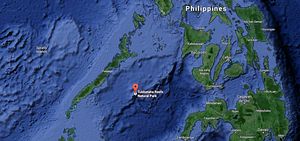In a move likely to further increase tensions between Beijing and Manila, a Philippine court has sentenced 12 Chinese fisherman to prison for illegal fishing. The crew members, who were arrested at Tubbataha Reef, were sentenced to between six and ten years in prison, with the boat captain receiving the maximum sentence of 12 years. All 12 men still face trial on a separate charge, possession of protected species — specifically, the pangolin, an endangered mammal hunted both as a luxury food and for use in medicine.
These fisherman were detained within waters universally recognized to belong to the Philippines, the Sulu Sea, located to the east of Palawan Island. Their boat reportedly ran aground on Tubbataha Reef, which is listed as a UNESCO World Heritage Site. The fishermen claimed that they had merely taken refuge there to avoid a storm, Voice of America reports. They pleaded not guilty to all charges.
This particular case may be most important as a precedent for another, more sensitive trial. Back in May, the Philippines arrested 11 Chinese fishermen on similar charges of illegal fishing and poaching of endangered species (two of the fishermen were underage and were later released, leaving nine in custody). Unlike the dozen men who were just sentenced, those fisherman were arrested in disputed waters near the Spratly Islands, roughly 100 kilometers (62 miles) west of Palawan. Manila claimed the fisherman had encroached on its 200-mile EEZ, while Beijing claimed they were fishing within Chinese waters and demanded their immediate release. In an interview with the South China Morning Post, the fishermen likewise said that they had been illegally detained within Chinese waters. The men told SCMP they did not recognize the legality of the case against them.
By comparison, the Chinese fisherman just sentenced, who were arrested in non-disputed waters, provoked a far milder response. In response to that case, the Chinese Foreign Ministry said in a statement that China “attaches great importance to the security of its fishermen abroad, while educating and supervising them on their fishing activities.” Should the trial of the nine fishermen arrested near the Spratlys come to a similar conclusion, expect Beijing to be far more vocal in its response.
The pre-trial of the nine fisherman arrested near the Spratlys has been postponed at least four times since May, a possible indication that Manila is cautious about moving forward with such an incendiary case. Given the high level of tensions between China and the Philippines at the moment, movement on the trial of Chinese fishermen captured in a disputed region would cause a major outpouring on anger from China — especially as the case this week proves Philippine courts are inclined to throw the book at illegal fishing activities.
An earlier incident involving Japan might give the Philippines an idea of what to expect should the trial move forward. In 2010, Japanese authorities attempted to try a Chinese fishing boat captain for ramming Japanese coast guard vessels near the disputed Senkaku/Diaoyu Islands. Official and popular outrage from China (including massive anti-Japan protests and a decision to halt rare earth exports to Japan) forced Tokyo to release the captain instead. The 2010 incident marked the beginning of a particularly rocky period in China-Japan relations.

































